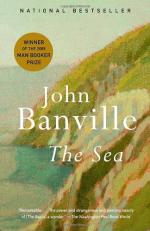|
This section contains 575 words (approx. 2 pages at 400 words per page) |

|
The Sea Summary & Study Guide Description
The Sea Summary & Study Guide includes comprehensive information and analysis to help you understand the book. This study guide contains the following sections:
This detailed literature summary also contains Topics for Discussion and a Free Quiz on The Sea by John Banville.
This poetically written novel takes the form of a series of journal entries written by a lonely middle-aged man as he spends what he sees as his final days in a guesthouse near the scene of a tragedy in his childhood. Themes relating to the nature of identity and death are explored as the narrator's past and present intertwine in an experience of life both haunting and inescapable.
The novel begins with an evocation of the sea and of the narrator's sense of impending death. He then unfolds a series of ever-deepening memories, past and present intertwining in his life and in his writing as he explores and relives his experiences with two powerful female influences: his childhood friend Chloe, and his beloved wife Anna.
As the narrative progresses, the narrator's recollections of his intense summer with Chloe parallel recollections of his equally intense last few months with Anna, who is dying of a fatal disease. Underpinning all these recollections is the narrator's apparent awareness of his own death - he writes in detail of how he feels it approaching, like the tides of the sea, and how he wonders whether this summing up of his life is in fact a preparation for death.
The narrator includes in his memories of Chloe stories of his initial infatuation with her mother, his fascination with her mute twin brother Myles, his relationship with her governess Rose (a relationship consisting of equal parts contempt and pity), and his unease with her father. His memories of Anna include a visit to a doctor's office to receive confirmation of the terminal diagnosis, their mutual discomfort with the narrator's mother (embittered after being abandoned by her husband early in their marriage), and her increasing discomfort as her illness progressed. Underpinning both sets of memories is the narrator's deepening awareness of having used both Chloe and Anna as a means of escaping his detested early life, which was poverty stricken, emotionally violent, spiritually empty. At one point, perhaps inadvertently, the narrator reveals that the name to which he's referred throughout the novel is not his real name, but the name under which he publishes his works of academic research. Indications are, in fact, that he has completely submerged his true identity - it seems he has accomplished his goal of submerging himself, but as the poetic/metaphoric writing in the novel reveals, his past is coming back to haunt him.
As the narrator's memories and experiences of his present life become more and more entwined, a sense of narrative tension builds to the novel's climax - the narrator's simultaneously remembered and recounted deaths of Chloe (by drowning) and Anna (from her fatal disease). Shortly after recalling these key moments in his life, an incident in the present drives the narrator to get drunk and make a half-hearted suicide attempt, from which he is rescued by one of the other inhabitants of the guesthouse. As he recovers, the narrator's writings reveal that the proprietor of the guest house, to whom he has referred throughout the novel almost in passing, is revealed to be the mature version of Rose, Chloe's governess.
As the novel draws to a close, the narrator seems to have come to a kind of peace with both his impending death and his troubled life. The inevitable tide, somehow comfortable in its inescapability, has come in and there is at last, at least, the possibility of peace.
Read more from the Study Guide
|
This section contains 575 words (approx. 2 pages at 400 words per page) |

|



